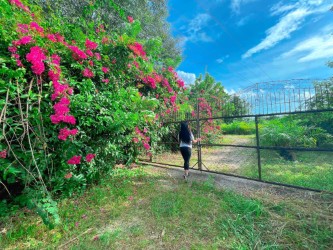
Between Two Worlds
When I tell people that I moved from nuclear medicine to agriculture, their first reaction is usually confusion. “How does that even happen?”, they ask. To most, these fields seem worlds apart, one is rooted in high-tech diagnostics; the other in soil and seasons. But for me, the transition wasn’t about leaving something behind; it was about answering a deeper calling.
For generations, my family’s agricultural business has provided for us, shaping not just our livelihood but our values. As the eldest daughter of a farmer, I always knew that our family’s agricultural business was part of my heritage. I had built a career in nuclear medicine. I was drawn to its precision and its ability to diagnose and heal. However, when the time came for me to step up and take over, I felt immense pressure. My grandfather and father had built this business through decades of hard work, and I feared that without the right knowledge or experience, I might let that legacy slip away. I had no background in business, no expertise in agriculture – just a deep sense of responsibility and purpose.
The deeper I immersed myself in agriculture, the more I saw the connections between my past and present careers. Both fields require scientific knowledge, attention to detail, and a commitment to sustainability, whether it’s sustaining human health or the health of the land. And as I take on this new role, I found myself confronting not just agricultural challenges but deeper systemic issues: gender disparities in farming, the need for sustainable food systems, and the importance of leadership that nurtures rather than depletes.
From Radiopharmaceuticals to Regenerative Agriculture
In nuclear medicine, every scan, every dose of radiation is calculated meticulously for effectiveness and safety. In agriculture, the same level of care must be applied to soil management, resource allocation, and sustainable practices. Just as a PET/CT scan provides insight into the human body’s inner workings, modern farming demands healing for our soils and food production systems through an understanding of ecosystems, plant physiology, and long-term environmental impact.
My scientific background has given me a unique perspective in agriculture. I approach farming like an experimental process: analysing data, testing variables, and optimising for the best outcomes. But while medicine offers immediate results, farming requires patience. Seeds don’t sprout overnight; a single season’s success or failure is part of a much larger cycle. This shift in mindset from instant diagnosis to long-term nurturing has been one of my greatest lessons; one that I hope to bring with me into building the next generation of my family’s legacy.
Women in Agriculture: Breaking Barriers, Cultivating Change
As I stepped into agribusiness, I quickly realised that agriculture, like many industries, remains male-dominated. Women play a crucial role in global food production, yet they often have less access to land, funding, and leadership opportunities.
The irony is that women have always been central to agriculture, whether tending family farms, running agribusinesses, or pioneering sustainable practices. Studies have shown that if women had the same access to resources as men, global food production could increase significantly, reducing hunger and poverty.
This isn’t just a fight for gender equity; it’s a fight for food security and a sustainable future. Women-led agricultural enterprises are often at the forefront of regenerative farming, organic production, and ethical food supply chains.
This means that in this next step of my journey, I will have to overcome disproportionate challenges compared with my male counterparts. Learning from the challenges I have already faced, I hope to continue to prove that women can, and do, thrive in driving change and taking positive steps towards a future that is better for not only humanity, but also the planet.
Cultivating the Next Generation of Food Producers
Beyond helping run my family’s business, I’ve sought to create change by investing in the future of agriculture. I believe the next generation needs to see farming not just as a livelihood but as an innovative and essential industry shaping the world’s food security and sustainability.
Through various initiatives, I’ve worked to expose young people to urban agriculture and sustainable food production. The goal isn’t just to teach farming, it’s to inspire future agripreneurs and food system leaders. If we want resilient and equitable food systems, we must empower young people, especially women, to take the lead.
Redefining Success: Leadership Without Burnout
Stepping into leadership, whether in medicine or agriculture, comes with immense pressure. The weight of responsibility, the expectation to succeed, and the long hours can easily lead to burnout. But I realised that true leadership isn’t about relentless hustle, it’s about sustainability, in every sense of the word.
Too often, we glorify overworking, particularly for women who are expected to juggle multiple roles in the workplace and at home. But just as the land needs time to rest and regenerate, so do we. My journey has taught me that self-care, balance, and strategic delegation are not signs of weakness; they are essential to long-term success.
Success isn’t about titles or prestige, it’s about creating systems that continue to thrive and drive positive change over generations, whether in healthcare, agriculture, or any other field.
A Future Rooted in Equity and Sustainability
As I look to the future, I see a world where agriculture is no longer seen as a man’s industry, where women-led enterprises flourish, and where farming is recognised not just as a livelihood but as a solution to global challenges.
Agriculture isn’t just about food; it’s about climate action, economic resilience, and community empowerment. And as I take on this role, I am reminded that leadership isn’t about where you start – it’s about the impact you create.
For those women standing at a crossroads, unsure whether to stay in their field or pivot to something new, I offer this: Your skills, your knowledge, and your passion are transferable. What matters is not the title you hold but the difference you make.
And sometimes, the best way to heal the world isn’t through a hospital, it’s through the soil beneath our feet.
Written by Maria Confina P. Labao
Views: 45
